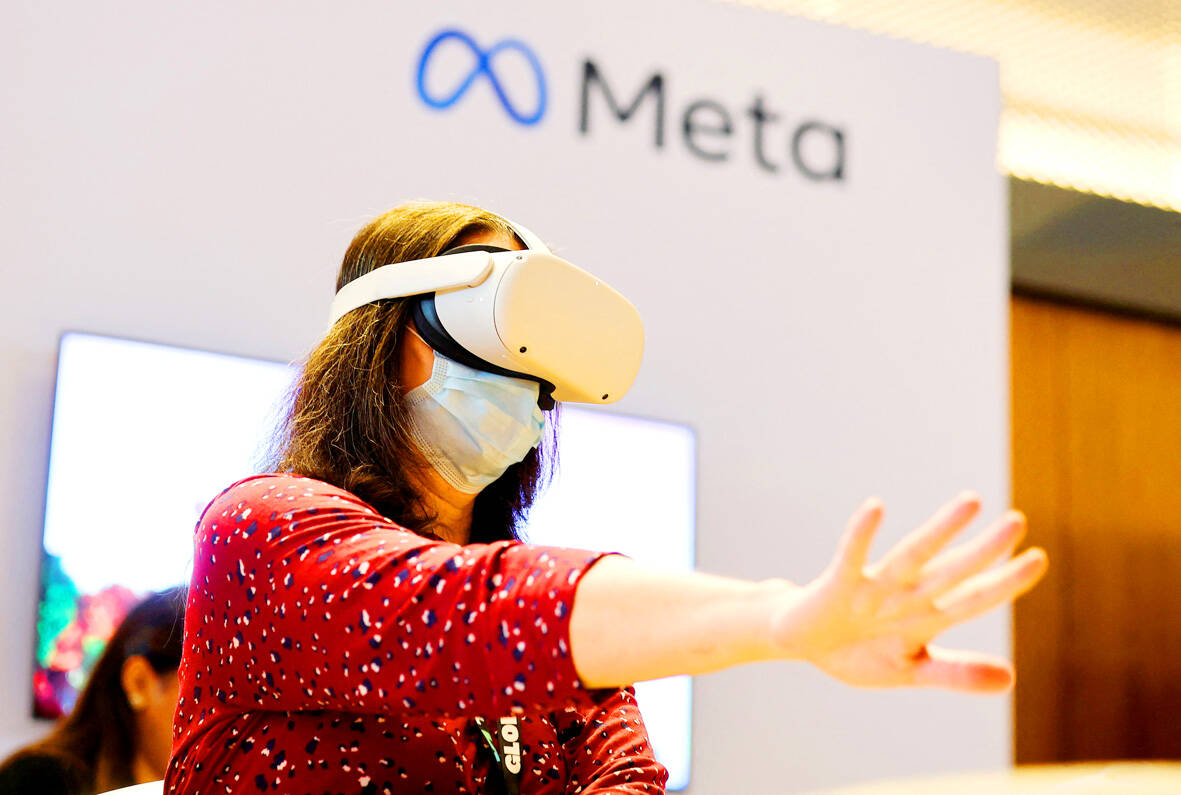John Carmack resigned from his leadership role at Meta Platforms Inc’s virtual reality (VR) unit, citing frustration with its slow progress and disagreements over strategy with company founder and chief executive officer Mark Zuckerberg.
The games industry veteran said in his resignation note that he had long been frustrated by the poor operational efficiency of Meta’s VR endeavor, which he never felt adequately able to influence in the right direction.
Carmack, 52, joined VR developer Oculus in 2013 ahead of its acquisition by Meta — then still known as Facebook — in 2014. Having started at Oculus as chief technology officer, he became an executive consultant for VR at Meta.

Photo: Reuters
Zuckerberg renamed the company Meta to signal its commitment to developing a “metaverse” of virtual 3D experiences.
“I have a voice at the highest levels here, so it feels like I should be able to move things,” Carmack said in the note. “But I have never been able to kill stupid things before they cause damage, or set a direction and have a team actually stick to it.”
The games industry veteran — who founded id Software, which produced classic first-person shooter games Quake and Doom, and helped usher in 3D graphics for PC video games — wrote on Twitter that he found a “notable gap” in strategic thinking between himself and Zuckerberg.
He believes “everything necessary for spectacular success is right there, but it doesn’t get put together effectively,” he said.
Meta is spending billions of US dollars each year on its metaverse and VR project, and its Meta Quest 2 is widely regarded as the best VR headset on the market.
The company said in October that the operating losses of the Reality Labs unit that houses the venture would grow significantly next year, which was not welcomed by investors looking for more cost discipline from tech companies.
“It is impossible to overstate the impact you’ve had on our work and the industry as a whole,” Meta chief technology officer Andrew Bosworth said of Carmack.

AI BOOST: Although Taiwan’s reliance on Chinese rare earth elements is limited, it could face indirect impacts from supply issues and price volatility, an economist said DBS Bank Ltd (星展銀行) has sharply raised its forecast for Taiwan’s economic growth this year to 5.6 percent, citing stronger-than-expected exports and investment linked to artificial intelligence (AI), as it said that the current momentum could peak soon. The acceleration of the global AI race has fueled a surge in Taiwan’s AI-related capital spending and exports of information and communications technology (ICT) products, which have been key drivers of growth this year. “We have revised our GDP forecast for Taiwan upward to 5.6 percent from 4 percent, an upgrade that mainly reflects stronger-than-expected AI-related exports and investment in the third

Mercuries Life Insurance Co (三商美邦人壽) shares surged to a seven-month high this week after local media reported that E.Sun Financial Holding Co (玉山金控) had outbid CTBC Financial Holding Co (中信金控) in the financially strained insurer’s ongoing sale process. Shares of the mid-sized life insurer climbed 5.8 percent this week to NT$6.72, extending a nearly 18 percent rally over the past month, as investors bet on the likelihood of an impending takeover. The final round of bidding closed on Thursday, marking a critical step in the 32-year-old insurer’s search for a buyer after years of struggling to meet capital adequacy requirements. Local media reports

TECHNOLOGICAL RIVALRY: The artificial intelligence chip competition among multiple players would likely intensify over the next two years, a Quanta official said Quanta Computer Inc (廣達), which makes servers and laptops on a contract basis, yesterday said its shipments of artificial intelligence (AI) servers powered by Nvidia Corp’s GB300 chips have increased steadily since last month, should surpass those of the GB200 models this quarter. The production of GB300 servers has gone much more smoothly than that of the GB200, with shipments projected to increase sharply next month, Quanta executive vice president Mike Yang (楊麒令) said on the sidelines of a technology forum in Taipei. While orders for GB200 servers gradually decrease, the production transition between the two server models has been

ASE Technology Holding Co (日月光投控), the world’s largest integrated circuit (IC) packaging and testing supplier, yesterday announced a strategic collaboration with Analog Devices Inc (ADI), coupled with the signing of a binding memorandum of understanding. Under the agreement, ASE intends to purchase 100 percent shares of Analog Devices Sdn Bhd and acquire its manufacturing facility in Penang, Malaysia, a press release showed. The ADI Penang facility is located in the prime industrial hub of Bayan Lepas, with an area of over 680,000 square feet, it said. In addition, the two sides intend to enter into a long-term supply agreement for ASE to